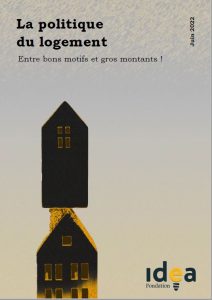Pour Commander un exemplaire imprimé du recueil :
© photo : Julien Mpia Massa
La politique du logement : Entre bons motifs et gros montants !
Principal poste de dépenses des ménages, élément central de sociabilité et de bien-être, puissant moteur d’inégalités, déterminant capital de l’attractivité, probable pièce maîtresse future du financement de la dépendance, actif dit réel assurant a priori une protection contre l’inflation, le logement est au cœur de la vie économique et de la question sociale. Dans un pays de la dimension du Luxembourg où les centres d’emploi ne sont pas multiples , le pouvoir d’achat élevé, la population en forte croissance à la faveur d’une immigration nette soutenue, et le désir de devenir propriétaire largement répandu, il est logiquement le sujet de préoccupation numéro un.
Hélas, la compréhension des mécanismes qui déterminent les prix immobiliers, influencent l’activité du secteur de la construction ou dictent les difficultés à se loger fait parfois défaut et la grille d’analyse de la politique du logement est plus souvent subjective, voire politico-passionnelle, que factuelle.
Dans ce recueil de la Fondation IDEA, agrémenté de commentaires externes, le verre (immobilier) n’est décrit ni à moitié vide, ni à moitié plein, mais tel quel. Puissent les réflexions qui y figurent alimenter judicieusement les débats et avoir autant de succès dans l’art de l’analyse que dans celui de la persuasion.
Consulter en ligne le recueil









Do you have the booklet in English?
Hello,
Thank you for your message.
Unfortunatly, this booklet is only available in french.
The first part of the analysis is very refreshing.
It is an important reminder that the vast majority of the electorate has a vested interest in high property prices and that no one lives under a bridge voluntarily.
There is a lack of sources being cited, but to an extend that is understandable as not much data exists (stunning given how much political discourse exists around the issue).
Some recent LISER studies to the topic make a mockery of any research done in Luxembourg with their scientifically worthless & highly politically tainted analysis and conclusions.
For example, the relatively simple calculus that we produce c. 3-4k units a year and that this will keep lasting pressure on the market is very welcome. It also goes to show how useless the “social” housing initiatives are. They don’t build faster despite recurring quality issues (and occasionally terrible design in places, like the new black prison in Kirchberg) and those initiatives tend to create new “HLM”s like in France. It is as if we did not learn anything from the past.
Now after the introduction I was hopeful that finally someone would take a fresh look. Unfortunately there the huge disappointment came. It looks like minister Kox allowed you to use your brain int he intro and then quickly turn it off again for the conclusion. Was that the price for the “press conference”? Yet another useless piece of writing like the LISER studies?
After basically saying that the current measures are largely useless and contribute to the problem instead of solving it, you conclude that it makes total sense to continue like what we did before: “Mais plutôt que d’être révolutionnaires, les évolutions à envisager devraient de préférence s’inscrire dans la continuité” p.38
here are a few hints of how to actually tackle the problem:
Generally the radical change that is needed is to look at housing as an elemental aspect of life and not an investment. Thus, by merely removing the “increase the return on investment” criteria you mentioned, much of the mess can be solved and Luxembourg can remain attractive.
1. Instead of using the impot foncier and basically increase the tax burden, there should be stringent capital gains tax on house sales (excluding primary residence if another residence is bought) and land sales.
2. Increase the proportion of social housing per year of inactivity on an empty plot. Plots reserved for children should be taxed higher.
3. Reduce VAT and transfer taxes on property. For a long lasting good VAT makes little sense and makes construction extremely expensive. Just make it say 6% for everyone all the time (including renovations). Delete the accelerated depreciation provisions. Make the land sale tax fix at a low level, say 2-3% for everyone to improve liquidity of the market. The higher amount of transaction and easier administration will bring in more revenue
4. Abolish notaries in their current form. It is currently a form of nepotistic rent seeking with no added value.
5. Add in rent control. Again housing should not be about investment return. Given that you can’t just build a 50 storey tower anywhere tomorrow it makes no sense at all to have a “liberal” demand side of the market. it just creates rent seeking by people adding no value to the economy. The current 5% rule of market value lacks transparency and is unworkable in practice.
6. Cap land prices
7. Facilitate expropriation for public uses
8. eliminate the entire useless housing pacts
9. create an interest deduction limitation rule for landlords that rent property, similar to the limits for homeowners.
10. The public should buy apartments / houses across districts to create social diversity. The current building of social housing blocks is a disaster waiting to explode in a few years. This requires more admin staff to manage the properties but eliminates the need for SNHBM as a developer and improves quality of the social housing stock. It can even be used to finance energy efficiency improving works in houses. The minimum proportions of social housing in new developments should be bought on completion by SNHBM (or the fons du logement) and then managed going forward.
Those 10 ideas would actually recognize the market failure (only the supply side is regulated) and would address the issues head-on instread of throwing ever more money around with ever more administrative burden and no results.